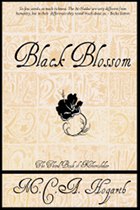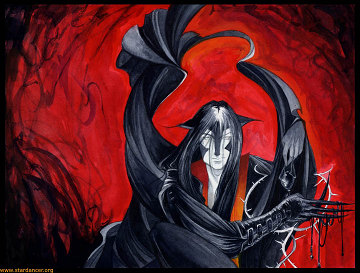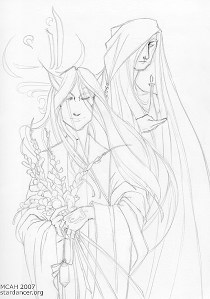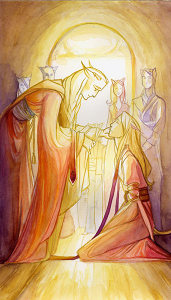Review: 'Black Blossom', by M.C.A. Hogarth
 This is labeled “The Third Book of Kherishdar”, following The Aphorisms of Kherishdar (reviewed in Anthro #18, July-August 2008) and The Admonishments of Kherishdar (Flayrah, April 4, 2012). Those two were slender “chapbooks” of less than 60 pages each, establishing the society and culture of the alien, ancient civilization of the Ai-Naidar of Kherishdar, in a series of parables of less than two pages each. Black Blossom is a full novel, telling of the culture shock that comes to the Ai-Naidar when a human comes to live among them.
This is labeled “The Third Book of Kherishdar”, following The Aphorisms of Kherishdar (reviewed in Anthro #18, July-August 2008) and The Admonishments of Kherishdar (Flayrah, April 4, 2012). Those two were slender “chapbooks” of less than 60 pages each, establishing the society and culture of the alien, ancient civilization of the Ai-Naidar of Kherishdar, in a series of parables of less than two pages each. Black Blossom is a full novel, telling of the culture shock that comes to the Ai-Naidar when a human comes to live among them.
See also: M.C.A. Hogarth's 'Black Blossom' tops $4600 on Kickstarter
“Black Blossom: A Fantasy of Manners Among Aliens”, by M.C.A. Hogarth.
CreateSpace, September 2012, trade paperback $18.95 (376 [+ 4] pages), Kindle/e-book $6.99.
Let me first put your hearts at ease by saying that I do not blame you for the unfortunate events that saw the House of Flowers remade. Many of you look upon our caste system and believe us incapable of understanding that all species are made up of individuals... but we do, and so I know that the acts of some ‘aunera’—aliens such as you—do not reflect upon you all.
Nor do I think the situation with House Qenain was without its compensations... for it is because of the problems afflicting Qenain that I came to meet Shame. (p. 1)
But Kherishdar is an empire spanning three worlds and several colonies, and we are many and our culture old. With so many Ai-Naidar it is inevitable that some will transgress. And for the times when we do, then we call upon those who serve Shame to bring that virtue to us, so that we may once again remember our place and become good members of society. (p. 9)
The narrator is the almost nameless Calligrapher (his name is not mentioned until considerably into the novel) who is the personal ‘osulkedi’ (the topmost rank of the Public Servant caste) of Thirukedi, Emperor of Kerishdar. He has been tasked before by Thirukedi to travel throughout the empire to high-caste Households whose members have fallen into usually-ignorant transgression, to serve as an instrument of Correction. This time, his mission is even more delicate. In the Ai-Naidar way of allusion, he has been asked before to mend damaged pots before they break.
‘I have sent you on many assignments, but as... how shall I say. Preventative care. Pots under strain, that without a moment's respite would have developed flaws. You have eased hearts and pressures both by reminding those in need of the virtues of Kherishdar..’ (p. 3)
This time, an unusually important pot is broken and needs to be repaired: an osulkedi like himself, the high priest who serves Shame.

‘Sometimes no effort is enough,’ He said. ‘I am sending you to the Bleak.’
My silence was not the silence of respectful attention, but of shock.
‘There,’ Thirukedi said, ‘you are to deliver my message to the ‘osulkedi’ who serves Shame. He has been there the better part of two seasons now, attempting Corrections of those most in need... but it is enough. His services have been requested by House Qenain's gate complex, and it is there you will tell him to go, on my command.’
He sipped his tea and finished, ‘He is the broken pot.’ (p. 5)
As the subtitle says, this is a fantasy of manners among aliens. It is told by a middle-aged Ai-Naidar in the Ai-Naidar manner, replete with circumlocutions and lengthy digressions.
And now a digression, for several of you have asked about tea, and I am delighted to oblige your curiosity. For tea is emblematic of our species, indeed!—we consider it the official drink of the empire. Many are the tracts that discuss its virtues. (p. 13)
The story is interrupted for a two-page discussion of the Kherishdar version of tea and of how important it is in the Ai-Naidar culture. Is this important to the story? Wait and see.
The Calligrapher journeys to meet the ‘osulkedi’ in question, who, like the Calligrapher himself, has set aside his own name to be known by the office he serves: “I have been sent to find the Public Servant who serves Shame.”
The Calligrapher describes Shame as brilliant … and strange. Physically as well as temperamentally; he looks like a photographic negative, white hair and eyebrows on a black-skinned face. The Calligrapher uses Shame’s personal name as he describes his first sight of him:
Kor ‘Nai'Nerillin-‘osulkedi’ was an ink drawing, a few slashes cutting a vital, compact shape from the world around him. And black: ancestors! So rare a color among us, black entirely save for the shock of white on his face. His pupils were black pits surrounded in more white, with a thin gray ring to mark their borders— we call it ‘arvarnari elet’, coronal eyes, after the pale halo around the sun at its eclipse, and I had never seen such distinct and uncanny examples. There was nothing comfortable about him, not even the way he entered the room, his movements brusque and strangely precise. Nothing. I was not certain whether to be intimidated by him... or fascinated.
Because, oddest of all, he had a beauty. From his voice to the way he stood across from me to the manner in which he fixed his eyes on me, all of it was of one piece. My brows furrowed as I contemplated this unexpected harmony, and I didn't even realize I was staring until one of his white brows cocked. (p. 17)
As the story progresses, the reader slowly gains an expanding picture of the Ai-Naidar and their culture, and of the fauna and flora of Kherishdar.  (The Ai-Naidar are very slender; they flick their ears a lot, and they have tails, but otherwise look like humans.) Shame accepts the Calligrapher as his companion at first because it is the emperor’s wish; they slowly become close friends, Farren and Kor. The Calligrapher gradually realizes in what manner Shame is a broken pot and is to be mended. At the same time, he sees that Shame’s mission to House Quenain, the House of Flowers, is especially delicate, because House Quenain has become subtly tainted by alien contact, and the alien influence may spread throughout Kherishdar.
(The Ai-Naidar are very slender; they flick their ears a lot, and they have tails, but otherwise look like humans.) Shame accepts the Calligrapher as his companion at first because it is the emperor’s wish; they slowly become close friends, Farren and Kor. The Calligrapher gradually realizes in what manner Shame is a broken pot and is to be mended. At the same time, he sees that Shame’s mission to House Quenain, the House of Flowers, is especially delicate, because House Quenain has become subtly tainted by alien contact, and the alien influence may spread throughout Kherishdar.
Other characters enter the story: young Ajan, Shame’s personal Guardian; Saraeda, Quenain’s head scientist (?); a Physician; a Decoration; Haraa, a ‘fathrikedi’. What is a ‘fathrikedi’? The drawn-out manner of the narrative makes it difficult to spell out individual details. Observation becomes friendship becomes love. Can the ancient, stratified Ai-Naidar culture adapt to human violence? The two previous chapbooks of aphorisms and admonishments seem like setups for this Black Blossom.
Frankly, I suspect that this genteel narrative moves too slowly for most Furry fans. But it is a rich story that depicts a deep and carefully thought-out world. Hopefully there will be more of it for discerning readers.
About the author
Fred Patten — read stories — contact (login required)a retired former librarian from North Hollywood, California, interested in general anthropomorphics

Comments
Post new comment